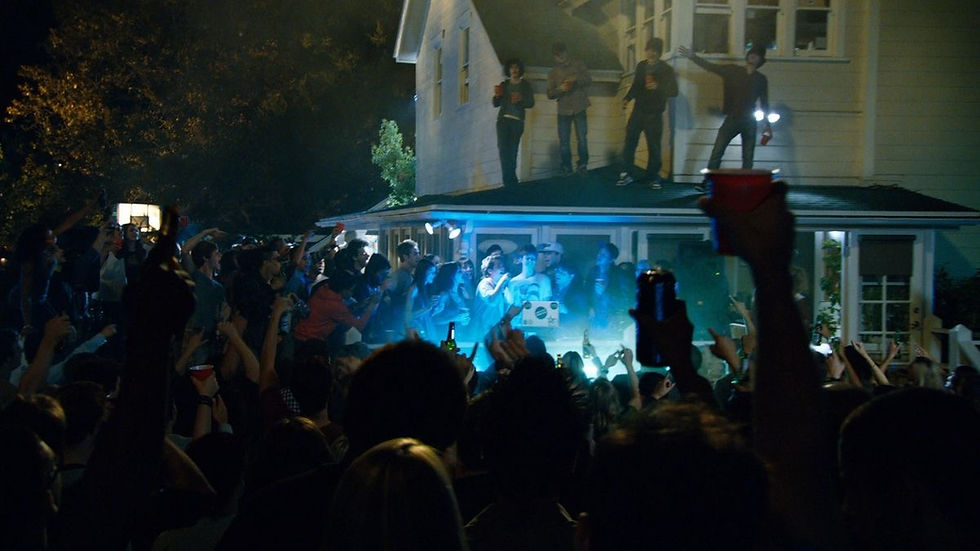The Club is Dead
- Eriel Pichardo
- Sep 18, 2025
- 3 min read
The fear of being seen, and the death of being human
by: Eriel Pichardo

Credit: Project X (Amazon Prime)
Lately, there’s been this creeping sense of timidness. It plagues our everyday lives and leaves our social interactions with this awkward, icky feeling that makes us wonder if everyone’s suddenly become socially inept. The clubs are empty, dating has become obsolete—replaced with situationships, and painfully awkward small talk.
After COVID, we’ve seen the rise of the loneliness epidemic and the death of third spaces—those informal gathering spots like cafes, bars, gyms, and parks that exist outside the structures of home and work or school. These are places where friendships spark, community builds, and strangers become something more than passing faces. Its decline paired with the rise of hyperindividualism, it is no wonder we’re finally noticing the social consequences.
We’ve lost social conventions that build community and a sense of belonging among strangers. Whether that be at work or school, a simple hello or smile has been deemed an overextension.
What’s replaced those casual connections isn’t warmth. In the age of digital communication, we’ve deeply embedded a system that affects our social interactions and power dynamics. Surveillance culture characterizes the current social framework.
Everyone has a cellphone. We’ve seen the many TikToks and Instagram reels of peoples’ most embarrassing moments along with some cutthroat think pieces critiquing celebrities' every move.
Whether it’d be someone dancing a little too hard at the bar or bashing a celebrity for denying a fan a photo—we have been conditioned to anticipate judgment before it happens. We’ve turned ordinary moments into public entertainment without consent. It becomes ingrained in our heads that we are being watched—subconciously or not.
The “fear of being seen” isn’t just a TikTok term from think pieces that pop up on your For You page when you’ve been doomscrolling for hours on end. It’s a symptom of surveillance culture—a fear of being ridiculed on the internet for thousands, if not millions, to see.
We’re constantly told that everyone is too occupied worrying about themselves, that they won’t notice our drunken mishaps that end up on Barstool. But is that entirely true?
As humans, we are inherently imperfect. From our deviated septums to male pattern baldness, perfection was just never in the cards for us. But thanks to the digital age, we can now be recorded by strangers for having one too many green tea shots and letting loose at the club. Waking up the next morning with a hangover and the realization that you’ve become a laughing stock as the internet decides you need to be punished.
Cancel culture plays a huge role into how we interact with others both on and offline—surviellance culture’s mirror image. It’s also a big reason for the massive wave of social hesitation: we are constantly surveillanced.
Cancel culture was originally formed to hold people accountable by calling out the racists and bigots of the internet. But now it’s become a way to attack people both on and offline in the name of moral righteousness.
These outcries for more authenticity have been completely muted and are directing us towards a path characterized by a culture of performative perfection. It’s forced us to not only surveillance others but ourselves as well.
These systems have completely shifted the way we view morality and thus the way we interact with each other. Gen Z has a morality problem—turning it into a competition rather than an actual conversation. There is no room for error and that simple fact has drained us of spontaneity and texture—every interaction smoothed, every edge sanded down. It’s completely stripped places like clubs of any social caliber.
Maybe what we need isn’t another moral code, but the freedom to be clumsy, to be messy, to be human again. To be able to dance our hearts out at the club, or sign up for a yoga class just for the hell of it. We’ve learned to watch ourselves so carefully, we’ve forgotten how to live. If we don’t reclaim that right, authenticity won’t just be endangered—it will remain extinct.
Eriel Pichardo is a recent UF graduate who is obsessed with culture, chaos, and the occasional existential crisis. He’s known for taking way too many green tea shots and ignoring his own advice




look mining…
look mining…
look mining…
look mining…
look mining…
look mining…
look mining…
look mining…
dcrmining dcrmining
dcrmining dcrmining
dcrmining dcrmining
dcrmining dcrmining
dcrmining dcrmining
dcrmining dcrmining
look mining…
look mining…
look mining…
look mining…
look mining…
look mining…
look mining…
look mining…
dcrmining dcrmining
dcrmining dcrmining
dcrmining dcrmining
dcrmining dcrmining
dcrmining dcrmining
dcrmining dcrmining
look mining…
look mining…
look mining…
look mining…
look mining…
look mining…
look mining…
look mining…
dcrmining dcrmining
dcrmining dcrmining
dcrmining dcrmining
dcrmining dcrmining
dcrmining dcrmining
dcrmining dcrmining
look mining…
look mining…
look mining…
look mining…
look mining…
look mining…
look mining…
look mining…
dcrmining dcrmining
dcrmining dcrmining
dcrmining dcrmining
dcrmining dcrmining
dcrmining dcrmining
dcrmining dcrmining
look mining…
look mining…
look mining…
look mining…
look mining…
look mining…
look mining…
look mining…
dcrmining dcrmining
dcrmining dcrmining
dcrmining dcrmining
dcrmining dcrmining
dcrmining dcrmining
dcrmining dcrmining